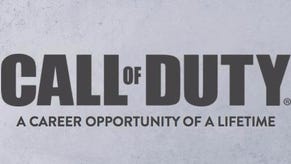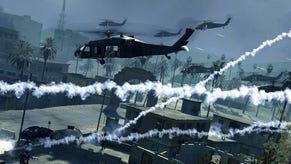Genetically Modified Gaming
It looks like an MMO, but it isn't an MMO. Yet.
Published as part of our sister-site GamesIndustry.biz' widely-read weekly newsletter, the GamesIndustry.biz Editorial offers analysis of one of the issues weighing on the minds of the people at the top of the games business. It appears on Eurogamer after it goes out to GamesIndustry.biz newsletter subscribers.
What was the biggest massively multiplayer online game of 2007 - and, indeed, of 2008 so far? Ignoring the obvious answer - "World of Warcraft, again" - I'd argue for a rather unusual answer to this question. Not Lord of the Rings Online, not Tabula Rasa. No, to my mind, the biggest massively multiplayer online game of 2007 was Call of Duty 4: Modern Warfare.
Of course, in the strictest possible sense, CoD4 isn't an MMO. Each individual game instance holds only a few dozen players, after all - although if you really wanted to turn this into a pub argument, you could introduce the fact that World of Warcraft also restricts your party size to an absolute maximum of 25 players in its instanced dungeons.
Rather than miring ourselves in that impossible debate, though, consider the ways in which Call of Duty 4 does resemble a massively multiplayer game. Each player character is persistent, levelling up through the ranks by gaining experience - earned either by killing enemies, or by completing in-game tasks. As you level up, you unlock the ability to use new or upgraded weapons, and learn new abilities, and thanks to the persistent nature of your character, those abilities stay with you throughout future encounters.
In many ways, the system I've just described is a more important part of the MMO concept than the whole "massively" element itself. COD4 may lack the ability to see large crowds milling around waiting to go into instanced combat zones (although you'll see hundreds of names in lobbies in the course of an evening's play), but the levelling up, unlocking of new gear and learning of new abilities are all lifted directly from the MMO playbook.
Given that COD4 is far and away the most successful online console game of the current generation thus far, it's obvious that there are lessons to be learned from Infinity Ward's approach. With regard to the surprisingly MMO-like progression system, I'd say that there are two key areas which publishers and developers need to pay attention to.
Firstly, from the point of view of a significant part of the industry - those working on console or PC games with single-player and multiplayer modes - the lesson is simple. MMOs have dominated headlines in the games industry's news feeds in recent years not just because World of Warcraft has been a huge success, but because they're onto something big. The sector may be shockingly expensive, risky as hell and littered with the corpses of high-profile failures, but the player numbers overall keep growing and the rewards of success are immense. They're doing something right.
Call of Duty 4 proves that it's possible to take some of the things that MMOs do right and distil them for a game that wouldn't traditionally be seen as an MMO. The potency of the idea, even in this form, is obvious; the drive to play just a little bit more, because there's a reward waiting just up ahead, is an incredibly powerful and addictive force for players.
What other ideas could work, carried across wholesale from the MMO model and turning existing game genres into MMO-lite contenders? Persistency and progression is an obvious, powerful and surprisingly under-utilised one - but in the hands of a gifted development team, couldn't the same transition be made by concepts like player economies, large-scale Player vs Enemy encounters, virtual world interactions and a host of other concepts that MMOs, to some extent, really get right?














